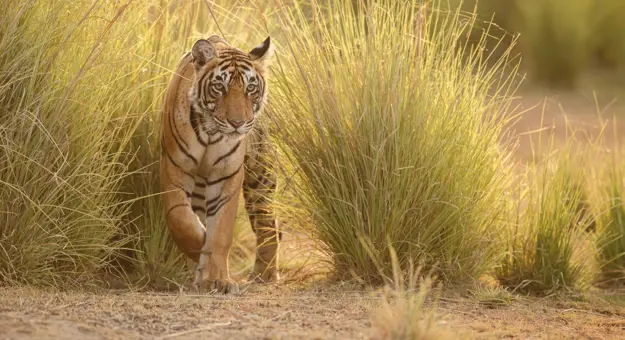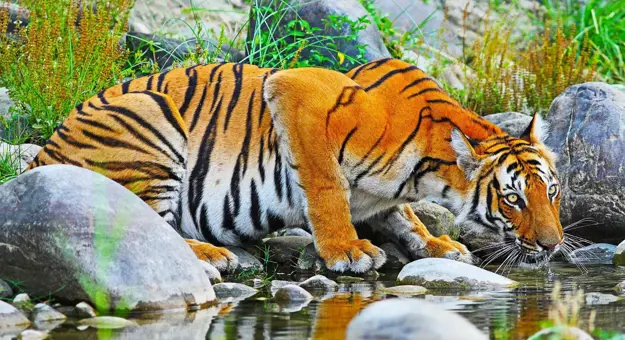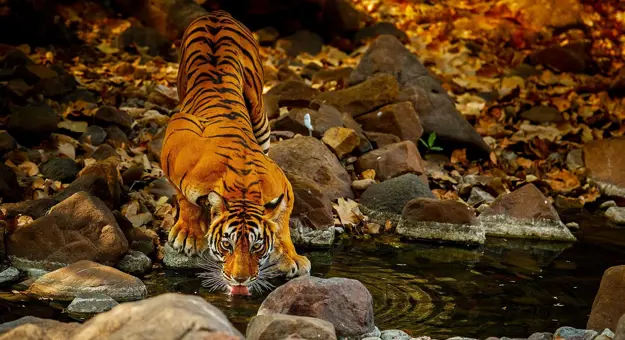
How to see the tigers of Ranthambore National Park
Bengal tigers are one of the most majestic species roaming our planet, yet few have the opportunity to see one of these endangered beauties in their natural habitat. Fortunately, visiting a tiger reserve – like the stunning Ranthambore National Park in Northern India –gives you a rare chance to find signs of tiger activity, and if you’re lucky, spot one of them for yourselves.
Located in the Sawai Madhopur district of Rajasthan - just 280 miles from Delhi and 115 miles from Jaipur - Ranthambore National Park is well known for its tiger population, and is a popular destination if you want to venture into the wild and explore India’s incredible nature.

The History of Ranthambore National Park
The area of Ranthambore National Park used to serve as the royal hunting grounds of the Maharajas from nearby Jaipur. A formidable 10th-century hill fort – that you can visit as part of your trip to the park – serves as a reminder of the long history and importance of these grounds in developments over the past centuries.
Following a raft of new conservation and animal protection legislation passed by the government in the 1970s – especially Project Tiger – parks like Ranthambhore became important national wildlife reserves.
Now protected from hunters and poachers, tiger numbers are finally on their way up for the first time in conservation history.
Declared a tiger reserve in 1973 and a national park in 1980, Ranthambore National Park covers a vast area of 151 square miles, and is divided into 10 distinct safari zones closely managed by conservation authorities.

How to see the tigers of Ranthambore National Park
Ranthambore National Park is popular for a good reason – it has one of the highest densities of Bengal tigers in the country and therefore offers visitors a good chance of spotting tigers. The region’s climate also works in nature lovers’ favour: the park’s gorgeous landscape consists of dry deciduous forest and grassy meadows, making it easy to spot wildlife while on safari.
Nonetheless, lady luck must be on your side if you want to see one of the park’s magnificent big cats basking in the sun, or sauntering through the forest.
Tigers are known to be incredibly territorial, marking their areas with urine, secretions, and scratch marks on trees and rocks. Skilled naturalists will be able to spot these signs of tiger activity and lead you to a possible sighting of a tiger.
At last count in 2014, there were 62 tigers scattered around the park, up from previous census numbers. Lucky visitors might see one of the park’s beloved tigers like Sundari, a tigress born in 2006 who fiercely defends her territory around the lakes.
Visits to Ranthambore National Park are conducted via organised open-air safari rides. Depending on the time of year, safaris start in the morning from 6-7am and end at 9:30-10am, while in the afternoon they start at 2-3pm and finish between 5:30-7pm.
If you are taking a trip with Newmarket Holidays, you will have the chance to explore what the park has to offer with organised two safaris: one in the morning, and another in the afternoon.
You will be joined by an expert naturalist who will guide you in searching the woods for tiger activity, as well as leopards and other exotic species that live in the park.

More than just tigers
While tigers are the main draw for visitors to Ranthambore National Park, nature lovers will find a wealth of other flora and fauna to explore and admire.
Other cats in the park include the spotted leopard, and the caracal - a medium-sized cat with long, tufted ears. Across the landscape you will find deer and antelope – such as chital, sambhar, chinkara, and nilgai - while looking above you might see langur and macaques hanging from tree branches. Hyenas, jackal, and desert foxes stalk the forests, while shaggy, black sloth bears scratch at the ground for insects.
Keen botanists will find around 300 unique species of deciduous tree types, which include banyan, pipal, and neem. Dhok trees make up around 80% of tree cover, with its leaves forming a key diet element of the park’s deer and antelope. A magnificent banyan tree – reportedly the second largest in the country - stands in the park just behind the Jogi Mahal, the forest guesthouse. Fruit trees include mango, khajur, acacia, palm, tamarind, jamun (known as the Indian blackberry), and khair (which is very popular with the park’s porcupines).
The three large talao (lakes) within the park make for a perfect bird watching sites. Bird enthusiasts will see kingfishers, hornbills, owls, nightjars, sandpipers, cranes, and many more migrant birds that make their way here from the Himalayas in the winter months.

Blending nature with history
Ranthambore National Park is unique in that in addition to its natural wonders, it also offers visitors a peek into India’s rich history. Ranthambore fort, which sits atop the hills in the park, is said to have been built either in the reign of Sapaldaksha in 944 AD, or during the reign of Jayant in 1110 AD.
Captured and recaptured by different rulers over the centuries, the fort played a key role as different factions fought for control over the region. The fort is one of several hill forts in India designated a World Heritage Site in 2013. Clambering 273 steps to the top, you’ll be rewarded with breath-taking views across the park.

When to visit and what to wear
Bearing in mind its closure during the monsoon season from July to September, October to April are generally the best months to visit Ranthambore National Park. On winter mornings it can get very chilly, especially while riding an open-air vehicle on safari, so wear layers, including gloves and scarf, which you can peel off as it gets warmer later in the day.
The North Indian summer from April to June tends to serve up blisteringly hot temperatures – often in excess of 40 degrees. Light layers of clothing are recommended, including a hat and sunglasses.
Discover more about what India has to offer in our India Destination Guide.
See the tigers of India on one of our tours
- On a guided tour, see the pavilions and palaces of Agra Fort and the famed monument of love, the UNESCO-listed Taj Mahal
- Visit one of Delhi’s most famous and historical monuments, Qutub Minar
- Travel by Jeep to the red sandstone ramparts of the sixth-century Amber Fort
- Flights included
11 days from £1,412 pp
was £1,765 pp
Dates Available
May 2026 - November 2028
Duration
11 days
Depart From
6 airports
Excursions & Visits
12 included
Meals
22 included
- Witness Chand Baori, Abhaneri's astonishing stepwell
- Visit the Taj Mahal at sunset in Agra
- Visit Amber Fort and Jaipur's exquisite Hawa Mahal, the 'Palace of Winds'
- Flights included
17 days from £4,119 pp
was £4,845 pp
Dates Available
May 2027 - November 2027
Duration
17 days
Depart From
1 airport
Excursions & Visits
17 included
Meals
23 included
- On a guided tour, see the pavilions and palaces of Agra Fort and the famed monument of love, the UNESCO-listed Taj Mahal
- Spend time on the shores of Goa, taking advantage of the beach resort’s amenities and the idyllic setting
- Journey on morning and afternoon safaris in search of tigers in Ranthambore National Park
- Flights included
15 days from £2,695 pp
was £3,170 pp
Dates Available
January 2027 - December 2027
Duration
15 days
Depart From
4 airports
Excursions & Visits
11 included
Meals
30 included
- Witness the Palki Ceremony at the Golden Temple and learn about the Sikh religion
- Discover the rich history of Jaipur during a city tour, covering the famed Hawa Mahal and City Palace
- Embark on safaris into Ranthambhore National Park, offering a rare opportunity to see animals up close
- Flights included
13 days from £2,410 pp
was £2,835 pp
Dates Available
May 2026 - November 2028
Duration
13 days
Depart From
5 airports
Excursions & Visits
14 included
Meals
25 included
Discover our blog
The ultimate Kathmandu and Himalayas wish-list
Experience some of the earth’s highest mountains and soak up the glory of a culture based on ancient spirituality.
World Pizza Day: Five unusual pizzas from across the globe
In celebration of World Pizza Day, discover five of the most unique varieties that are enjoyed across the globe.
Four musical meccas you won’t want to miss in the Deep South
It’s no secret that some of the best music in the United States can be found in the Deep South, but what spots stand out in each city?






